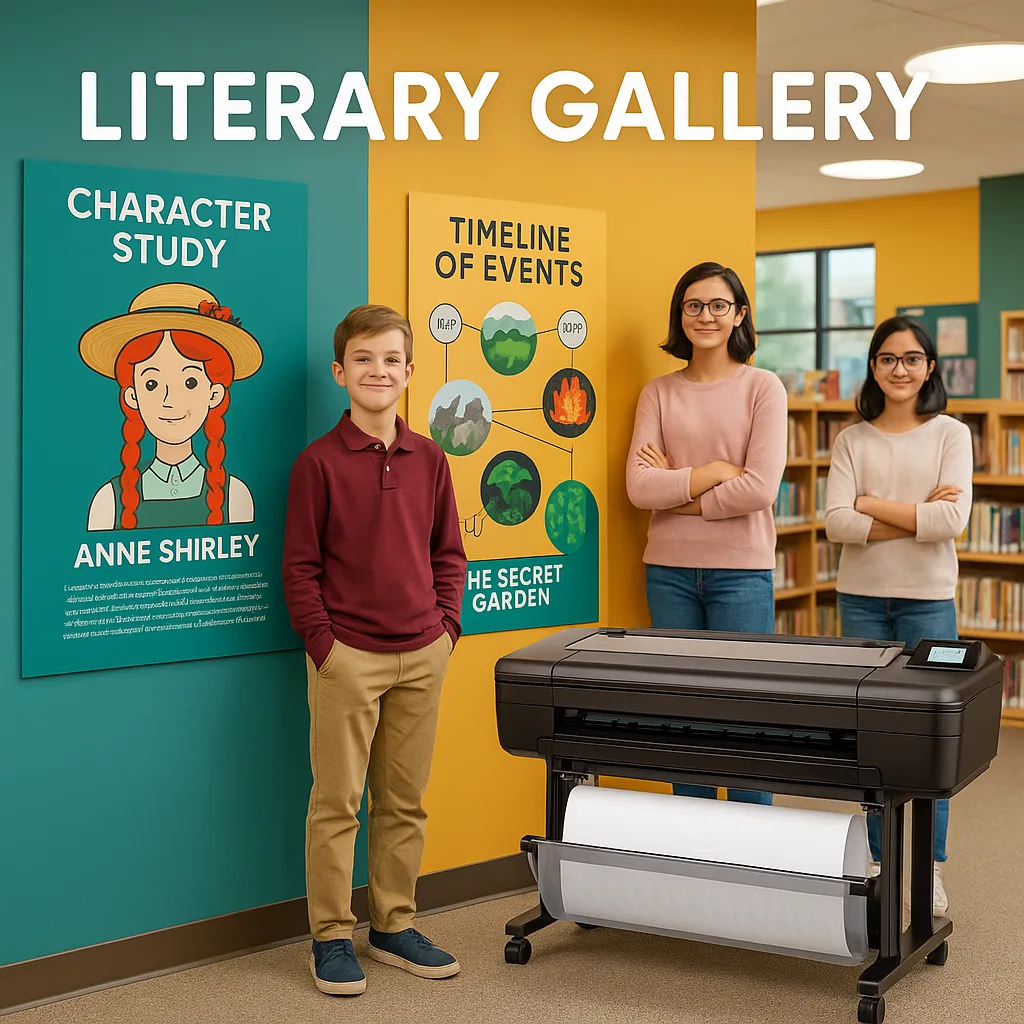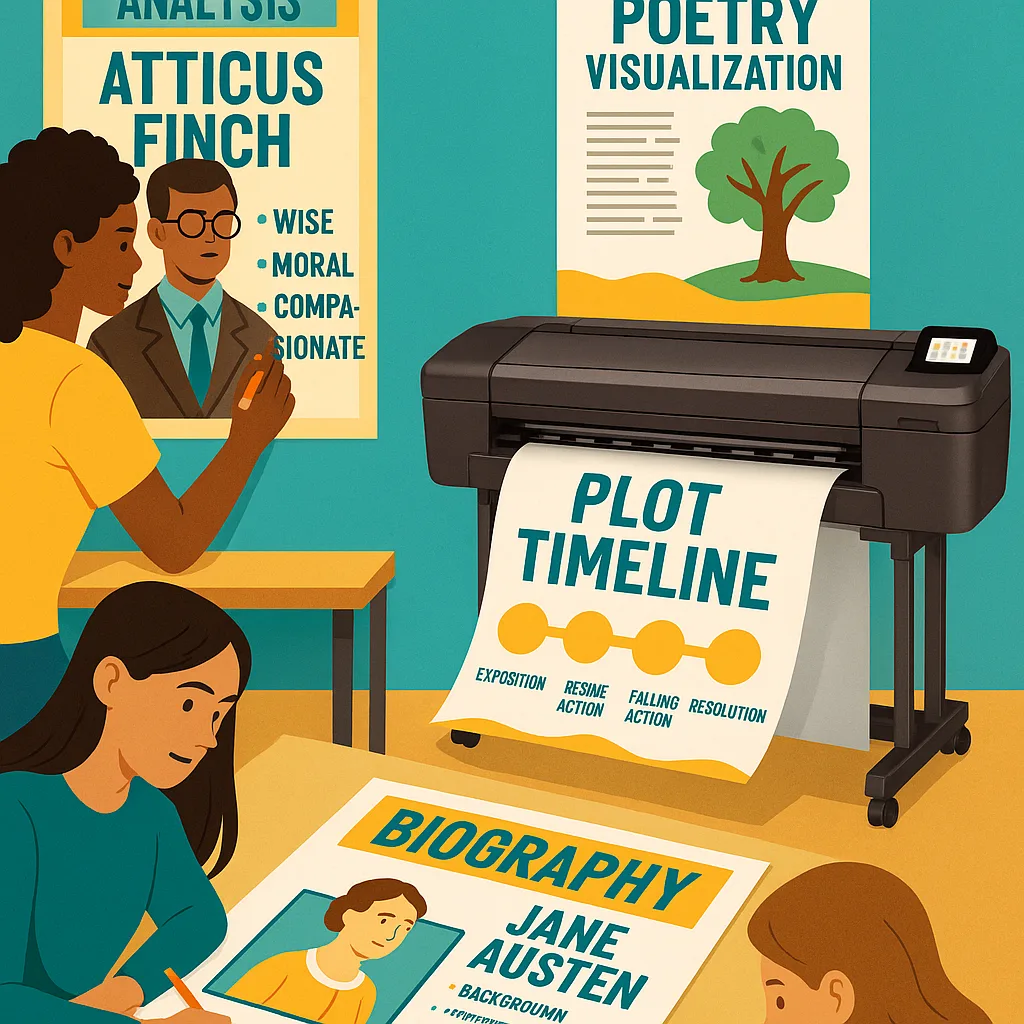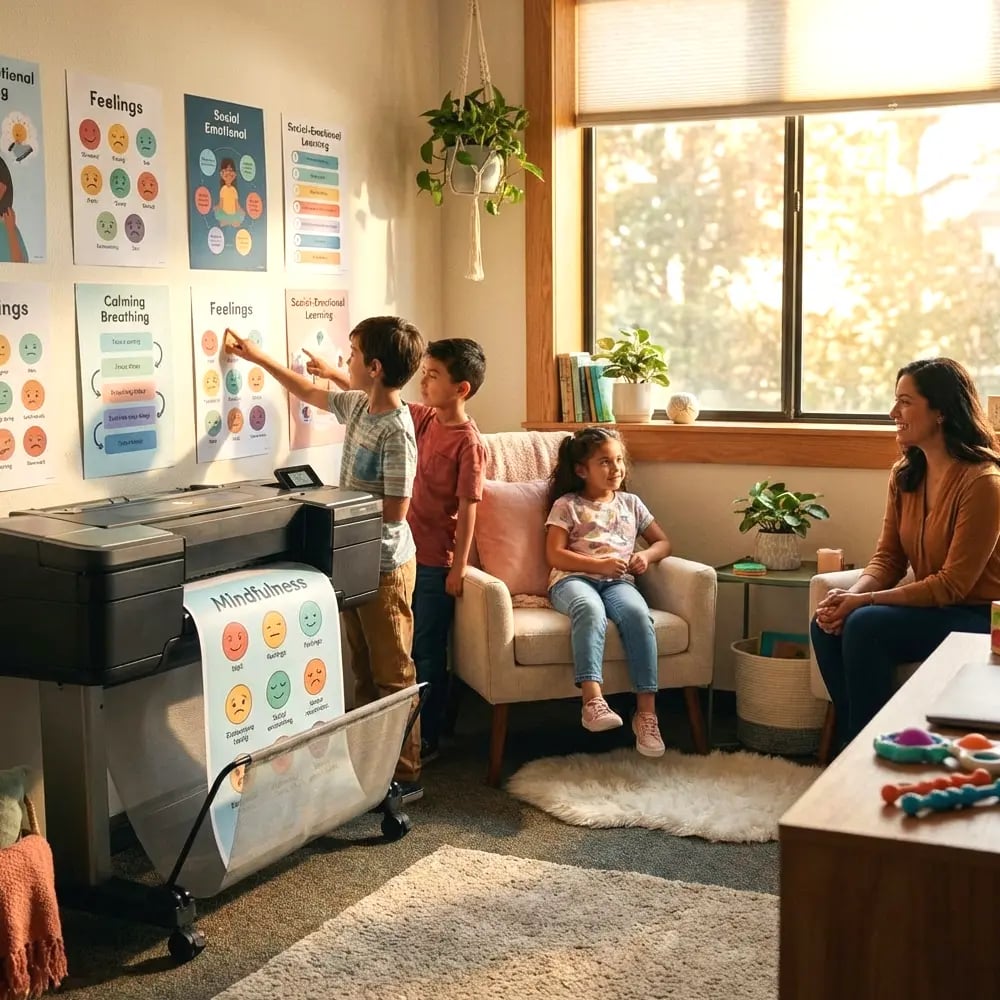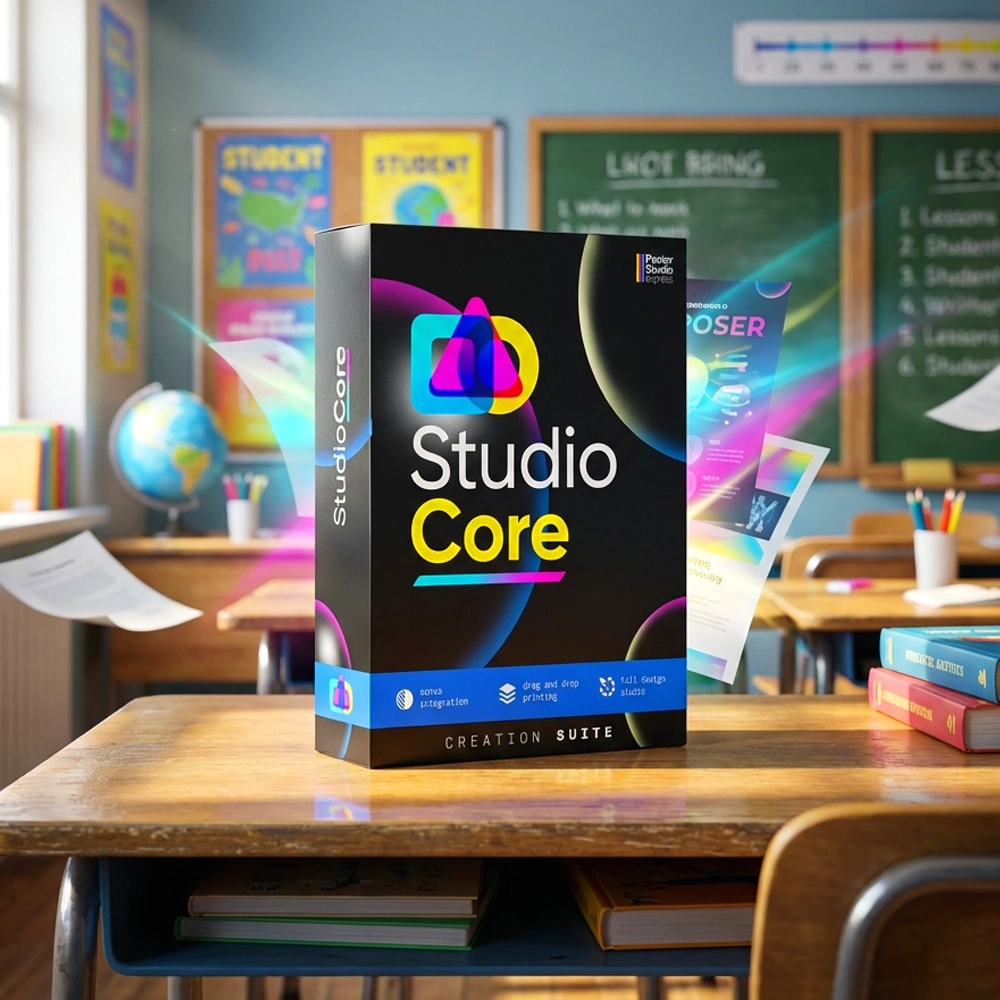
Picture this: Your students’ book reports transformed from flat papers into stunning museum-style exhibitions that draw crowds at Family Literacy Night. With the right approach and poster printer machines for literary displays, you can create gallery-quality presentations that rival professional museums—all while staying within your classroom budget. Let me show you how to turn your media center or classroom into a literary art space that celebrates student creativity and deepens comprehension.
Why Museum-Style Literature Displays Transform Learning
After eighteen years in library media education, I’ve discovered that when students create visual displays of their reading, something magical happens. They move beyond summarizing to truly interpreting, analyzing, and presenting literature in ways that spark conversations and inspire other readers. Museum-style displays tap into multiple intelligences while building 21st-century presentation skills.
Research from the National Council of Teachers of English shows that multimodal presentations increase comprehension by 40% compared to traditional book reports. Furthermore, when students take on the role of curators, they develop critical thinking skills that transfer across all subject areas. The visual nature of these displays also supports English Language Learners and students with diverse learning needs.

Setting Up Your Poster Printer Machines for Literary Displays
Creating museum-quality displays doesn’t require a museum budget when you have the right tools. A poster maker machine for school like the Education Express 36 provides the perfect canvas size for literary exhibitions while keeping costs around $1.50 per poster.
Essential Equipment Setup
Here’s what you’ll need to transform your space into a literary gallery:
Primary Display Creation:
• Wide-format poster printer (24″-36″ recommended)
• Satin Photo Paper for museum-quality finish
• Mounting supplies (foam core boards, adhesive strips)
• Basic laminating equipment for durability
Design Station Setup:
• Computer with design software access
• Student tablets or Chromebooks for research
• Color printer for supporting materials
• Scanner for incorporating student artwork
Genre-Specific Design Templates That Wow
Fiction Display Templates:
Character Gallery Walls – Students create life-sized character portraits with annotated personality traits, pivotal quotes, and symbolic objects. Using poster printer machines, they can print high-resolution backgrounds that transport viewers into the story’s setting.
Timeline Murals – Plot progression visualized through connected poster panels, each representing key story moments with illustrations and brief analyses. This format works brilliantly for complex narratives.
Non-Fiction Showcase Designs:
Infographic Exhibitions – Transform research into visually stunning data displays. Students synthesize information into charts, graphs, and visual hierarchies that make complex topics accessible.
Biography Timelines – Create immersive historical contexts with period-appropriate visuals, maps, and primary source reproductions printed on quality poster paper.
Poetry & Drama Installations:
Visual Poetry Walls – Combine typography art with imagery to bring poems to life. Students experiment with font choices, colors, and layouts to enhance meaning.
Scene Recreation Displays – Design theatrical backdrops and character costume sketches that help viewers visualize dramatic moments. These work beautifully for Shakespeare units!

Access professional design support with every poster maker
Training Student Curators: Building Exhibition Experts
Transform your students into confident museum curators with structured training that builds real-world skills
Week 1: Museum Basics
Introduction to curation principles and display aestheticsFoundation Skills
Students learn professional vocabulary, explore virtual museum tours, and understand how visual displays enhance storytelling. They practice with mini-displays using regular printers before moving to poster-scale work.Week 2: Design Principles
Color theory, typography, and layout fundamentalsVisual Communication
Using the school’s poster maker machine for school projects, students experiment with contrast, hierarchy, and white space. They create practice displays focusing on visual flow and readability.Week 3: Presentation Skills
Public speaking and audience engagement techniquesGallery Guide Training
Students practice explaining their displays, answering questions, and guiding visitors through exhibitions. They develop confidence presenting their literary interpretations to diverse audiences.Mounting Techniques for Professional Results Using Poster Printer Machines for Literary Displays
Professional mounting transforms student work from classroom projects into gallery-worthy exhibitions. Here are proven techniques that work within school budgets:
The Float Mount Method: Print posters with a 2-inch white border using your poster printer machines. Mount on foam core boards that extend 3-4 inches beyond the poster edges. This creates a sophisticated floating effect that mimics professional framing without the cost.
Gallery Rail System: Install simple picture rail molding along one wall. Use fishing line and binder clips to create an adjustable display system that allows for easy rotation of student work throughout the year.
Triptych Displays: Create three-panel presentations by printing connected designs across multiple posters. Mount on hinged foam boards that can stand independently or fold flat for storage.
“The visual impact of student literary displays has transformed how our community views student work. Parents are amazed!”
– Sarah Chen, 6th Grade ELA
Hosting Unforgettable Literary Gallery Walks
Transform your school into a bustling literary museum with these proven gallery walk strategies
Pre-Event Planning Timeline:
4 Weeks Before: Students begin creating displays using the school’s poster maker machine for school exhibitions. Schedule printing time slots to ensure all students have access. Send save-the-date notices to families.
2 Weeks Before: Finalize display arrangements and create gallery maps. Train student docents on their presentation stations. Print directional signage and program guides.
1 Week Before: Set up displays with proper lighting. Create QR codes linking to student book talks or additional resources. Prepare refreshment area with book-themed snacks.
Day of Event: Position student curators at their displays. Provide comment cards for visitor feedback. Set up a photo booth area with literary props for memorable family photos.
Making It Happen in Your School
Ready to transform your literature program? Here’s your action plan for success
Start Small, Dream Big:
Begin with one grade level or literature circle creating displays for a single genre study. Use your existing poster printer machines to produce 5-6 high-quality displays that showcase the potential of this approach. Document the process and student engagement to build support for expansion.
Once you see the impact, expand to quarterly gallery walks featuring different grade levels or subject areas. Many schools find that starting with a Teacher Pro Solo Package provides everything needed to test this approach before scaling up.
Building Community Support:
Share your vision with administrators by highlighting the alignment with literacy standards and 21st-century skills. Invite local businesses to sponsor gallery nights or donate mounting supplies. Partner with your PTA to promote events and recruit volunteer docents.
Consider applying for grants specifically for visual literacy projects. Many Title I schools have successfully funded their poster printer machines for literary displays through federal programs that support innovative teaching methods.
Your Literary Gallery Awaits
Museum-quality literature displays aren’t just for prestigious institutions—they’re achievable in every school with the right tools and vision. When students see their work displayed professionally, their investment in reading and analysis deepens dramatically. They become not just readers, but interpreters and presenters of literature.
Your poster printer machines for literary displays can transform any space into a celebration of student creativity and comprehension. Start planning your first gallery walk today, and watch as your school community discovers the power of visual literacy!






